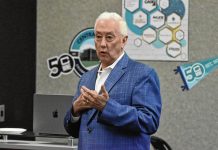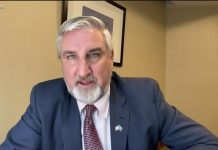The most common public attitude ex- pressed toward addicts is that other people would just as soon not deal with them.
That’s according to Tony Hoffman, featured speaker for the ninth annual Desperate Households Conference.
The event, sponsored by the Bartholomew County Substance Abuse Council, drew nearly 200 people to the three-and-one-half-hour morning session of Wednesday’s conference at Westside Community Church. A shorter session was conducted from 4:45 to 6:30 p.m.
Because of that public perception, Hoffman — a former inmate and recovering drug user who became a champion BMX bicycle racer — said there is always one message he wants people to remember after he speaks.
[sc:text-divider text-divider-title=”Story continues below gallery” ]
Every addict is somebody’s son, daughter, mother, father, sister or brother, Hoffman said.
“They are people we should care about, love and spend hours trying to help, because they deserve it,” he said. “That helps not only them, but benefits the entire community.”
Hoffman is founder and director of The Freewheel Project, a nonprofit organization that mentors thousands of youth through action sports. It teachers leadership skills and making healthy life choices.
Hoffman, whose BMX career began in high school, lost everything when he became addicted to substances at a young age and was sent to prison.
But he has been sober for the past 10 years, since May 2007.
Lisa Pein of Columbus, who lived more than 10 years with an active drug addiction until November 2011, also spoke during the conference.
Even after being in and out of jail or prison at least 10 times, Pein — a mother of two — said she could not stop using narcotics.
But when her parents engaged in a tough-love intervention that included forcing her out of the house and taking away her transportation, it made her feel like she lost everything she valued.
“That was a big motivator,” Pein said.
After putting both her recreational drug use and former drug-using friends behind her, Pein completed her associate’s degree in addiction studies and is now a certified drug and addictions counselor.
The conference’s third speaker was Dr. Theodora Saddoris, also of Columbus, who has provided medical-assisted addiction treatment since early 2014.
Saddoris listed some of the most common questions and perceptions about addiction.
Why don’t drug users ever learn from their mistakes?
Most people understand that sugar may cause a disease called diabetes, which damages the pancreas, Saddoris said.
In the same way, opioids causes a disease called addiction, which damages part of the brain necessary for free will and making rational choices, she said.
That’s when the impulsive side of the brain takes over, she said, and the overwhelming desire becomes avoiding withdrawal symptoms and feeling normal again.
Physical symptoms of drug withdrawal may include diarrhea, abdominal cramping, muscle aches and profuse sweating, but there’s also an emotional component, Saddoris said.
When a drug artificially makes you happy, the mind naturally builds up a number of negative emotions within your subconscious to balance your psychological state, she said.
If you suddenly stop the drug, those negative emotions will surface, Saddoris said. As a result, nothing makes the recovering addict feel happy, and even getting out of bed becomes a daily struggle.
Why do I have to pay extra taxes to help these people?
Hundreds of thousands of dollars already are being spent annually to house an inmate for one year, the physician said. But by treating addicts, instead of throwing them behind bars, substantially less tax money will be spent in the long run, and the addict stands a much better chance of making a full recovery, she said.
Since jail and prison are meant to punish individuals for making the wrong choices, Saddoris said it makes no sense to put addicts behind bars when they have no control over their choices.
Most people first get their addiction from a prescribed medication, and 15 percent of individuals become immediately addicted after taking the drug the first time, Saddoris said. Those facts greatly cloud the issue of fault and responsibility in addictions, the physician said.
If we just get them off the drugs, they’ll be fine.
That might be true if drugs were the only issue. But up to 60 percent of all people hooked on narcotics have genetically inherited their addictions, the physician said.
An equal percentage also have a separate mental disease that might include depression, bipolar or severe anxiety.
“We can’t just treat the drugs,” Saddoris said. “We have to treat the disease.”
One of the most difficult facts for people to accept is the length of time it takes for an opioid addict to recover.
A person in recovery can expect to experience negative feelings that include heightened anxiety and symptoms of depression for up to two years before they begin to feel relief, Saddoris said.
So for at least two years, a variety of sensory experiences could trigger a desire to relapse at anytime, the physician said.
Information: To learn more about Tony Hoffman and his programs, go online to tonyhoffmanspeaking.com
[sc:pullout-title pullout-title=”If you go” ][sc:pullout-text-begin]
What: Six-month update and unveiling of initiatives from the Alliance for Substance Abuse Progress in Bartholomew County, known as ASAP.
When: Tuesday at 6:30 p.m. Open to the public, no registration is required.
Where: The Commons, 300 Washington St.
Drug drop-off: ASAP has partnered with the Indiana State Police and Columbus Police Department to have drug take-back services at the event. Attendees may bring any controlled or non-controlled substances for disposal, with the exception of needles.
Information: Visit facebook.com/ASAPBarthoomewCounty or send an email to Rachel Kimmel at [email protected]
[sc:pullout-text-end]




